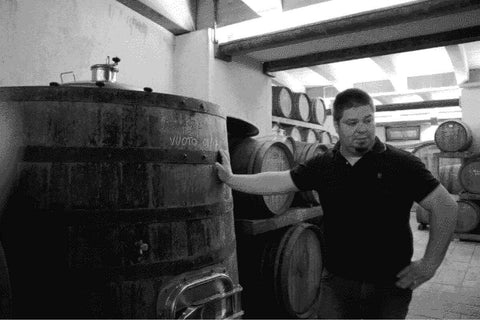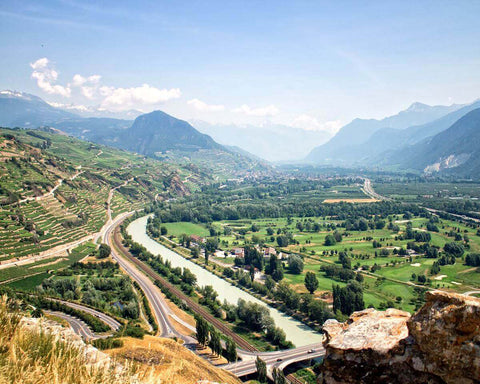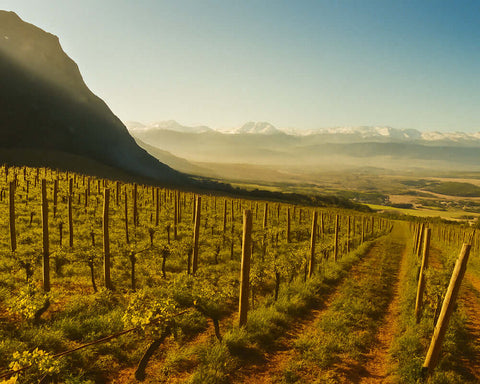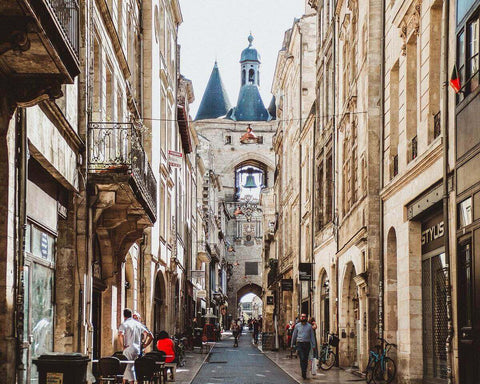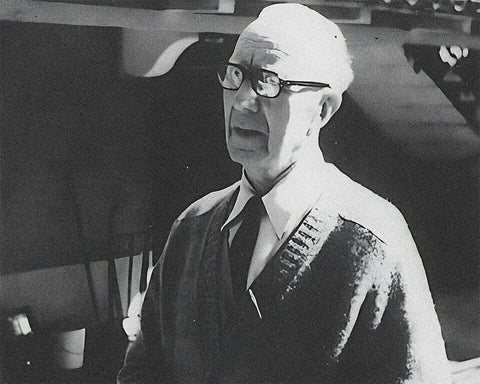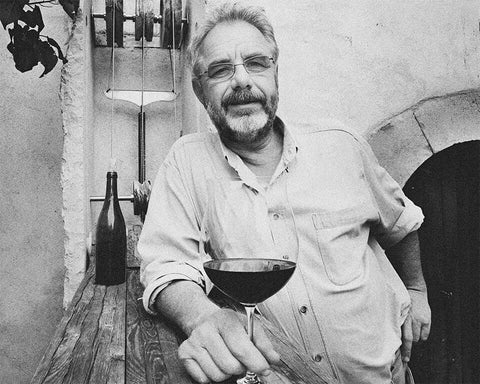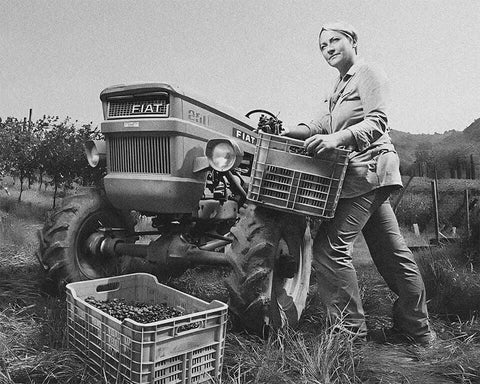Let’s start a bit philosophically with “what is natural wine for you?”
This is going to sound a bit provocative but to me, natural wine doesn’t exist. The term “natural” is used to identify those wines made with a certain specific philosophy in the vineyard and in the cellar. What we call natural wine should ideally indicate all wine. We accept the term and use it often, especially when we’re dining somewhere we don’t know well or new; it’s helpful in order to explain to the staff what kind of wine we’d like to drink.
The term is becoming so widespread that recently we were at a newly opened restaurant in a tiny village in Irpinia and we asked if they had any natural wines. They answered they didn’t at the moment but they absolutely wanted to add some to their list. Going back to the original question for us wine, real wine, is a cultural and agricultural product born from the transformation of grapes with nothing added whatsoever. Anything added to wine, in our opinion, just turns it into something other than wine.
How did your natural wine journey begin? Or better, your wine journey, since back then at the movement’s semi-prehistory the term was known but rarely used in the mainstream?
In the 1990’s Prof. Giardino was renowned to make outstanding wine for personal and family consumption in a local country house, which became a meeting point for Antonio, myself and a group of close friends. Without realising it at the time we were laying down the foundation for what would then become our lives’ greatest enterprise and adventure. We could barely imagine that we would have created an actual Cantina Giardino farm and winery.
So it was with the utmost carefree spirit that, in the late 1990s, we produced about 2,000 bottles, which we proudly uncorked and drank among family and friends. The idea for a winery began to take shape when we decided to print a homemade label for Cantina Giardino. Seeing an actual label on those early recycled bottles gave us a major input and inspiration. Obviously, we should emphasise the fact that we live in a terroir which has always had a deep vocation for viticulture, rich with autochthonous varieties and with old vineyards with vines trained with the local traditional “raggiera avellinese” and “starseto” methods.
Our winemaking philosophy is rooted in the safeguarding of these elder vineyards, many of which are pre-phylloxera and feature ancient and often almost-extinct varieties. The root apparatus of the vines is as majestic as what you can admire above ground, with the roots reaching deep into the soil and into the mother rock. The lymph nourishing the fruit travels through all the soil’s layers, gaining in richness and strength at each passage, thus contributing to giving us unique and much more complex grapes.
As someone who’s always been deeply in love with your wines, they were among my very first natural wines back more than 15 years ago, I remember how they were universes away from anything I drank before. The breadth and depth of flavor were staggering, initially a bit much to take in but then thoroughly enlightening. How was the general public’s reaction when you started selling the wines?
Simply put? Not good. It was probably way too early for the Italian market and palates, especially in the South. But we were in love with this project and never gave up; we had a weird confidence that in the future we’d be understood. Truth be told, it’s important to highlight that we never stopped being drinkers and drinking other wineries’ wines.
We called these “updating sessions” and we devote quite a bit of time to them. Luckily we found in foreign markets, especially Japan from the early 2000s onwards, the sensibilities for natural wines that were lacking in Italy and have begun to develop in recent years. This gave us hope and allowed us to turn the winery into our full time job.
Another classic question: is natural wine a fad or is it here to stay?
It’s undeniable that now natural wine is fashionable, and “hipsterism” does exist. That said, if among the growing number of people that approach natural wine even a few become passionate and appreciate the pleasure that these wines can give, these would be the same people that will contribute to building a more concrete and healthy drinking culture.
Likewise, I’ve never really shared the hysteria that at times can be seen among “early adopters” directed at the masses approaching this world. What anecdote would you single out as more illuminating along this journey?
In 2004 the revered food and wine writer Luigi Veronelli wrote this in his bi-monthly magazine about one of our Aglianico: “This is such an amazing wine that it reminds me of the concept of ‘moelleux’, the quality attributed to the greatest of French wines, which unites on the palate majestic substance and suave elegance”.
I cannot describe the strength we derived from the encouragement of a luminary of this stature. To this day this anecdote fills us with pure energy. The stories are endless: our natural wine journey allowed us to meet so many extraordinary vignerons such as Lino Maga, De Bartoli, Lorenzo Corino, Pino Ratti, Andrea Zanfei, Giuseppe Rinaldi, Antoine Arena, Marc Angeli, Oliver Cousin… As well as scores of passionate drinkers.
We travelled far and wide, often to Japan, where our importer Vinaiota, who has since become a dear friend, always gave us tremendous support. Important lifelong friendships were born, such as that with the wine writer Giovanni Bietti. We spent time with Lambrusco legend Vittorio Graziano, now pushing 70 plus, recounting stories of his colourful and still active love life.
Our job filled our lives with unending culture and richness, as well as social and family significance. We are super motivated to continue on this path for as long as we possibly can and maybe one day it will be some young vignerons that will visit us and touch our hearts.
You don't add SO2. How did you come to this decision and why?
We’ve completely abandoned using any SO2 with the 2006 vintage. Before that, we used a tiny amount at bottling but, looking at the lab results that we need for export, we discovered that the amount was so ridiculously small that it provided no protection or additional stability. So it was an easy choice to stop using it altogether.
I think that it’s becoming more and more common knowledge that wines with no added SO2 is much easier to pair with food, more alive and vibrant on the palate, it evolves in the glass, it’s more exciting, and it just makes you want to drink bucketfuls. Needless to say, we’re talking about a well-made wine, with the grapes being harvested ripe, at the right moment depending on the vintage, and well-interpreted when transforming it into wine.
How do you see the future for natural wine and the natural wine movement? Especially in the wake of the legislation that passed in France recently and of the push of some associations to establish a Europe-wide legal recognition.
We like to challenge ourselves and never establish any limits. We continuously have young interns working with us and bringing new and fresh ideas, basically, anything can happen here. Insofar as the future of natural wine, we do hope that there won’t be any more need for the adjective “natural”. This would become the only wine and the others will be classified as only alcoholic drinks. We realise this is a utopian hope but we like to live in a utopian climate, and we’d like to quote a dear friend no longer with us: “it’s industrial wine that should be certified as such, not the small artisan winemaker!”
This should emphasize again a fundamental concept that angers some natural winemakers: we are against legal certifications. The vigneron doesn’t need such guarantees, he or she is unique and one of a kind. This originality can never be appropriated by the giants of industrial wine!

